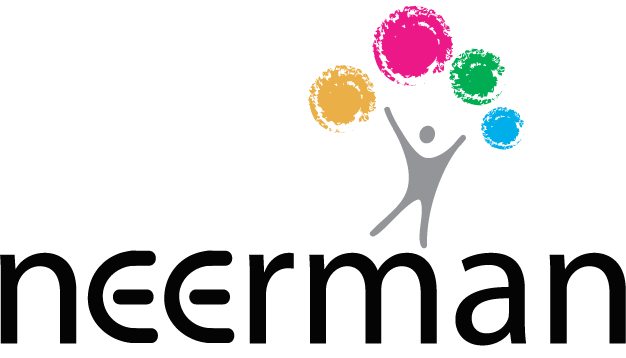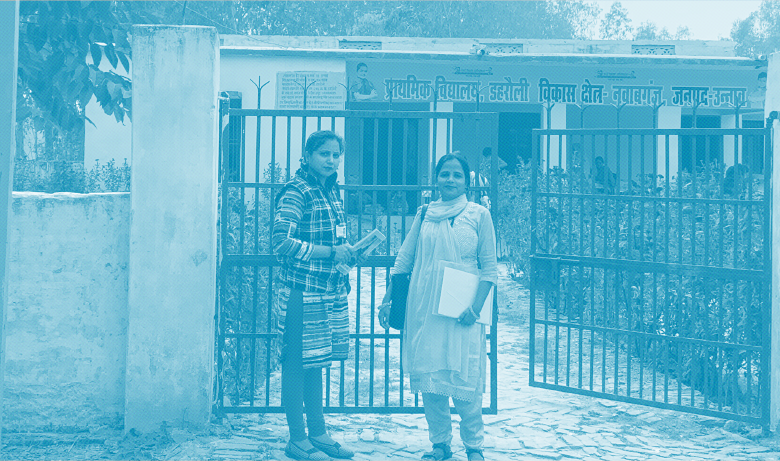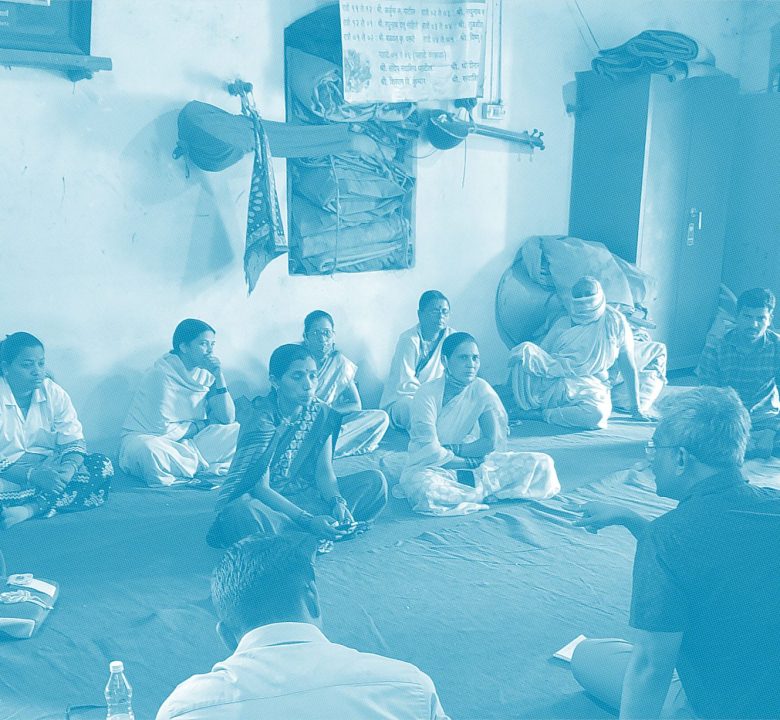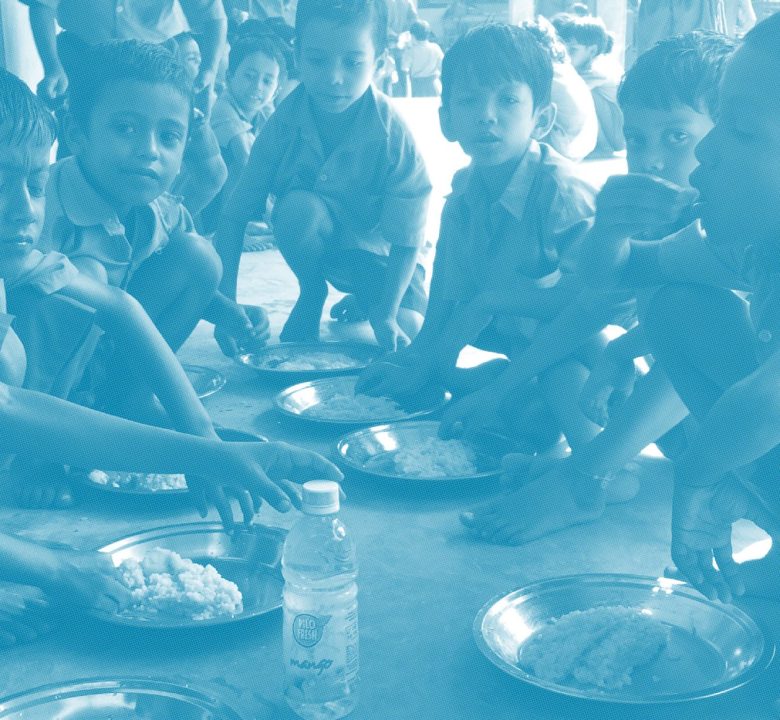Proving Attributable Impacts – Experimental, Quasi-experimental, and Observational Designs
November 18, 2020Covid-19 and NGOs – Impacts Now and Later
November 26, 2020Results-Based Monitoring: 4 Important Aspects of RBM (and Evaluation)
Monitoring of development programmes once focused on outputs of a programme and audit of inputs (mainly financial) to the programme. The focus today is on ‘budgeting for outputs but managing for outcomes.‘ [i]
Funding organizations, policymakers, and even implementers care about how beneficiaries have been actually helped and how effective their aid has been. Managing for outcomes necessitates a system that can help programme managers plan on outcomes, track inputs-outputs-outcomes, take corrective action, and demonstrate success. 10-steps Results-based monitoring and evaluation (RBM) system by the World Bank is a great way to do this well.[ii]
My blog explains four important aspects of RBM every NGO, CSR, Government that implements programmes should be aware of and I will also direct you to additional resources to learn more.
4 Important Aspects of Results-Based Monitoring
There are four important aspects of RBM we need to recognize, especially those who believe RBM is some kind of ‘research’ methodology or an advanced concept suitable only for large and complex programmes.
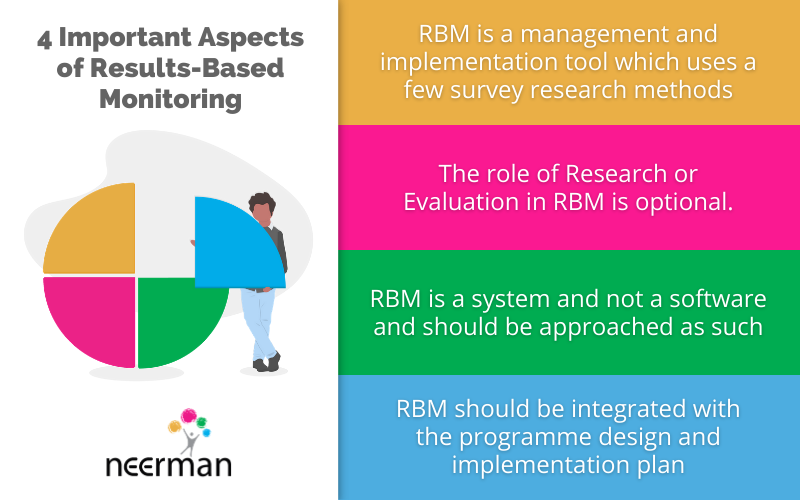
Aspect #1: RBM is first and foremost a management and implementation tool which uses a few survey research methods
First and foremost, RBM is a management and implementation tool that only uses a few survey research methods. RBM is similar to a management concept in the private sector called – management by objectives. Today, many variations of this concept exist such as objective-key-results management. There is even a term Results-based ‘Management’ which is another expanded form of the abbreviation RBM we have used. Therefore, designing and implementation of RBM requires necessary skills and experience in programme design, implementation, and management. While survey research skills will make you much better at RBM, research skills alone are not sufficient for designing and using RBM effectively.
Aspect #2: The role of Research or Evaluation in RBM (is optional)
Second, the role of research or evaluation is optional, but monitoring is not. A monitoring system needs to define indicators and use questionnaires or tools to measure those indicators. Sometimes, the measurements need to be done on the basis of sample surveys. Therefore, basic research skills required for RBM are questionnaire design and sampling. However, some RBM integrates the role of evaluation at prospective, formative, and summative stages to guide strategy, implementation or to demonstrate impacts. Evaluations can be internal or external and may need advanced research skills in statistics, economics, sociology, and subject matter expertise.
Aspect #3: RBM is a system and not a software and should be approached as such
Third, RBM is a system and not a software and should be approached as such. We find so many organizations rushing in to develop basic or highly customized software systems for monitoring but ignore the 10-steps of setting up, designing, and using RBM. For example, if the top management does not ‘use’ the monitoring reports for review and are not held accountable for the outcomes, then the programme may not work as effectively or efficiently as expected (just like any business wouldn’t without planning and accountability measures).
Most organizations also ignore or under-estimate the importance of the first step of RBM – readiness assessments. This stage will force you to ask tough questions about the purpose and use of RBM, assess whether an evaluation is indeed needed, fix responsibilities and accountabilities, assess internal interest-capability-capacity, identify the role of external organizations, and plan budgets and resources (including software for RBM). This step as important as developing a strategy execution plan for your business or organization is.
Aspect #4: RBM should not be independent of the programme but integrated with the programme design and implementation plan
Finally, RBM should not be independent of the programme but integrated with the programme design and implementation plan. Yes, monitoring is more useful to a programme when it is internal (and honest) and not used as an external audit tool. Often monitoring (or evaluation) is an afterthought so plans are not made on how the findings will be used for course correction. Monitoring data collection is best done by the grassroots implementation team but this role is not planned. Finally, the software or data reporting system can actually also be a job aid or a smart-guidance-system to help the grassroots staff take effective action based on data.
The World Bank handbook is a comprehensive guide to RBM and we highly recommend you read it carefully even though it might seem too big a document; pace yourself.[ii] NEERMAN is also developing a free training on setting up RBM for NGOs and CSRs and we hope to make it available to you all soon.
ADDITIONAL RESOURCES:
[i] https://www.oecd.org/governance/budgeting/44526575.pdf
[ii] http://hdl.handle.net/10986/14926
